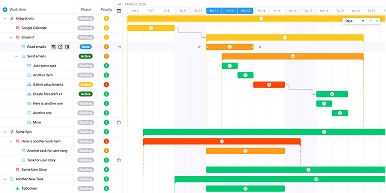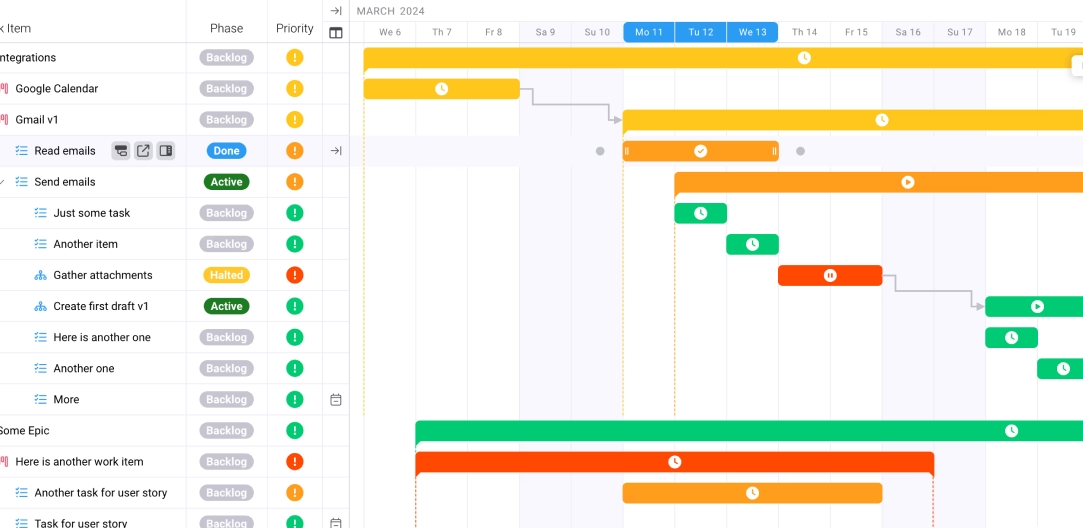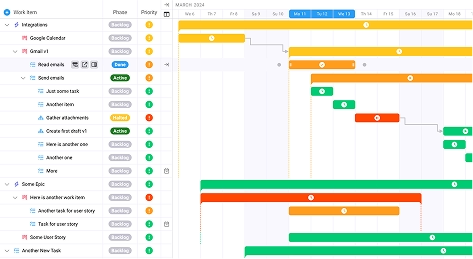
Omnichannel Marketing Strategies for Agency Success in 2025
Key takeaways:
In the dynamic landscape of 2025, omnichannel marketing strategies are critical for agencies aiming to deliver seamless, impactful customer experiences. These strategies integrate multiple channels—digital, social, and traditional—to create cohesive campaigns that drive engagement and loyalty. By leveraging advanced project management, data analytics, and emerging technologies, agencies can position themselves as industry leaders. This article explores actionable omnichannel marketing strategies to help agencies thrive, offering insights to optimize workflows, enhance client outcomes, and achieve sustainable growth in a competitive market.
Understanding Omnichannel Marketing in 2025
Omnichannel marketing goes beyond multichannel approaches by ensuring a unified customer experience across all touchpoints. A 2024 Harvard Business Review article emphasizes that omnichannel strategies prioritize consistency, personalization, and real-time engagement, resulting in 30% higher customer lifetime value compared to single-channel approaches. For agencies, this means orchestrating campaigns that seamlessly connect websites, social media, email, and offline interactions. In 2025, success hinges on integrating AI, data-driven insights, and agile workflows to deliver tailored experiences that resonate with diverse audiences.
Key Components of Effective Omnichannel Strategies
1. Develop a Unified Customer Journey Map
A cohesive customer journey map is the foundation of omnichannel marketing. Agencies must map every touchpoint— from awareness to conversion— to ensure consistency. Journey mapping can reduce churn by aligning messaging across channels. For example, a retail client’s journey might start with a social ad, continue through a personalized email, and conclude with an in-store promotion. Agencies should use CRM tools to track interactions and ensure each touchpoint reinforces the brand narrative.
2. Leverage Data for Hyper-Personalization
Personalization is the cornerstone of omnichannel success. A 2025 Forbes article notes that 80% of consumers are more likely to engage with brands offering personalized experiences. Agencies can harness first-party data from websites, social platforms, and CRM systems to tailor content. For instance, using AI to analyze browsing behavior can trigger personalized email offers, increasing conversion rates. Agencies should prioritize data integration to create a single customer view, enabling precise targeting across channels.
3. Integrate Emerging Technologies
Emerging technologies like AI, AR, and voice search are reshaping omnichannel marketing. Emerging marketing technologies built around AI-driven chatbots and predictive analytics can be game-changers for real-time engagement. For example, an AI chatbot on a client’s website can guide users to relevant products, seamlessly connecting to a mobile app for purchase. Agencies should adopt tools that support these technologies, ensuring campaigns remain cutting-edge and responsive to consumer trends.
Optimizing Project Management for Omnichannel Campaigns
4. Adopt Agile Methodologies
Omnichannel campaigns require flexibility to adapt to real-time feedback. Agile methodologies, like Scrum, enable agencies to iterate quickly. A 2025 Ravetree article notes that Agile reduces project delays by 25% through iterative sprints. For instance, a campaign team can test a social ad, analyze performance, and adjust messaging within days. COOs should train teams on Agile principles and use tools that support sprint planning and task tracking to streamline workflows.
5. Centralize Campaign Management
Managing multiple channels demands centralized project management. A 2025 Ravetree article emphasizes that integrated platforms reduce silos by consolidating tasks, timelines, and communication. For example, a centralized dashboard can track email, social, and PPC campaigns, ensuring alignment. Agencies should invest in tools with client portal features for real-time client feedback, enhancing transparency and collaboration.
6. Optimize Resource Allocation
Effective resource planning ensures omnichannel campaigns are staffed appropriately. Ravetree has found that balanced resource allocation boosts productivity by 20%. COOs can use tools to forecast capacity, assign tasks based on expertise, and monitor utilization. For instance, assigning a social media specialist and data analyst to a campaign ensures both creative and analytical needs are met, preventing bottlenecks and burnout.
7. Streamline Billing and Financial Tracking
Omnichannel campaigns often involve complex budgets across channels. It’s important to have a tool that integrates with QuickBooks, or other accounting software, for seamless billing. Agencies can track project costs, compare estimated versus actual fees, and create client rate cards with start and end dates. For example, a campaign with multiple team members can have unique bill rates for each role, ensuring accurate invoicing and profitability.
Enhancing Team Collaboration and Client Relationships
8. Foster Cross-Functional Pods
Omnichannel campaigns require collaboration across creative, technical, and strategic teams. COOs should form small, interdisciplinary teams—such as a designer, strategist, and data analyst—for each campaign. These pods ensure holistic campaign development, with tools like shared dashboards keeping teams aligned.
9. Prioritize Continuous Learning
The rapid evolution of marketing technologies demands ongoing training. Upskilling teams on AI and analytics boosts client satisfaction. For example, training on AI-driven ad platforms enables teams to optimize campaigns in real time. COOs should invest in workshops and certifications to keep teams competitive, fostering a culture of innovation and reducing turnover.
10. Strengthen Client Communication
Strong client relationships are vital for omnichannel success. Agencies should use CRM tools to track interactions and client portals to share campaign progress. For instance, a portal showing real-time ad performance builds trust and reduces miscommunication. Regular feedback loops ensure client needs are met, fostering long-term partnerships.
Overcoming Omnichannel Challenges
11. Manage Channel Integration
Integrating multiple channels can be complex. Agencies should adopt platforms that unify data from social, email, and web analytics, creating a single customer view. For example, integrating Google Analytics with CRM data ensures consistent messaging across touchpoints, improving campaign coherence.
12. Mitigate Scope Creep
Omnichannel campaigns are prone to scope creep as clients request additional channels or deliverables. It’s important to define scope in contracts and use change request processes. For instance, if a client adds a new social platform mid-campaign, project managers can negotiate adjusted timelines or fees, preserving profitability and clarity.
13. Balance Speed and Quality
Delivering omnichannel campaigns quickly without compromising quality is challenging. Agencies can use pre-built templates for email or social content to accelerate creation while maintaining brand consistency. Monitoring quality metrics, like client feedback scores, ensures high standards.
Measuring and Optimizing Omnichannel Performance
14. Track Cross-Channel KPIs
Tracking KPIs across channels is critical for measuring omnichannel success. Some useful metrics to track are customer engagement rates, conversion rates, and ROI. For example, comparing email open rates with social ad click-through rates reveals which channels drive results. Agencies should use dashboards to visualize data, enabling real-time adjustments to optimize performance.
15. Conduct Post-Campaign Retrospectives
Retrospectives drive continuous improvement by identifying what worked and what didn’t. After a campaign, teams should review data and client feedback to refine strategies. For instance, if email engagement lagged, the agency might adjust personalization tactics, ensuring better results in future campaigns.
16. Align with Strategic Goals
Omnichannel strategies must align with agency goals, such as increasing market share or diversifying services. COOs should prioritize campaigns that showcase expertise in emerging trends, like AI-driven advertising, to position the agency as a market leader and attract new clients.
Scaling Omnichannel Operations
17. Automate Repetitive Tasks
Automation enhances omnichannel efficiency and can save several hours weekly on tasks like email scheduling and social posting. Agencies should automate repetitive processes, such as report generation, to free up time for strategic work. For example, automated analytics reports allow teams to focus on optimizing campaigns rather than compiling data.
18. Invest in Scalable Systems
As agencies grow, omnichannel complexity increases. Agencies should adopt cloud-based platforms with features like time tracking and automated workflows to handle larger campaigns. For instance, scalable onboarding processes, like automated client intake forms, streamline new project setups.
19. Optimize Budget Management
Effective budget management ensures omnichannel profitability. A 2025 Ravetree article suggests using tools that track project costs and compare estimated versus actual fees. For example, assigning multiple team members to a task with different bill rates and roles ensures accurate budgeting. Agencies can also use rate cards with start and end dates to align pricing with campaign timelines.
Future-Proofing Omnichannel Strategies
20. Stay Ahead of Trends
Staying ahead of trends like voice search and immersive storytelling is critical. Agencies should experiment with emerging channels, like smart speaker ads, to maintain a competitive edge. Regular trend analysis ensures campaigns remain relevant and innovative.
21. Build a Culture of Innovation
A culture of innovation drives omnichannel success. COOs should encourage experimentation, such as testing AR campaigns, and reward creative solutions to keep the agency at the forefront of the industry.
Conclusion: Driving Agency Success in 2025
Omnichannel marketing strategies can empower agencies to deliver seamless, personalized customer experiences that drive engagement and growth. By leveraging unified journey mapping, data-driven personalization, and emerging technologies, agencies can create impactful campaigns. Optimizing project management, fostering collaboration, and aligning with strategic goals ensure scalability and profitability. With agile workflows, scalable systems, and a focus on innovation, agencies can position themselves as thought leaders, mastering omnichannel marketing strategies to thrive in the competitive landscape of 2025.









